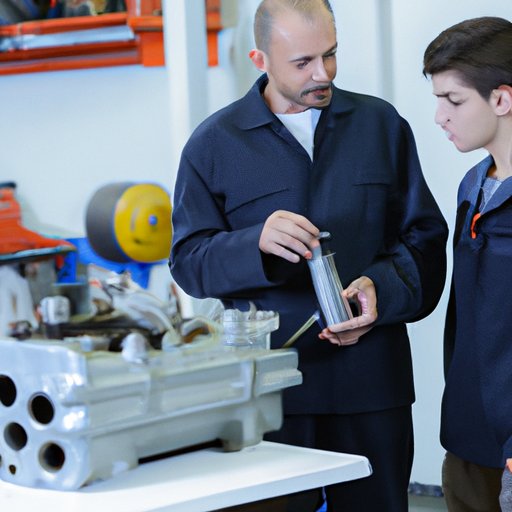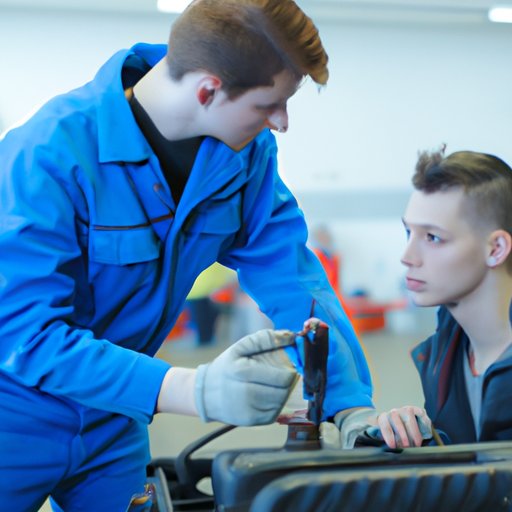Introduction
Becoming a car mechanic requires a combination of technical knowledge, problem-solving skills, and hands-on experience. In this article, we will explore what it takes to become a car mechanic, including necessary qualifications and certifications, as well as tips for acquiring an apprenticeship, developing knowledge of car parts and using diagnostic tools, taking courses in automotive repair, staying up-to-date on technology and trends, and networking with others.

Research Necessary Qualifications and Certifications
The first step in becoming a car mechanic is to research the qualifications and certifications that are required in your area. Different states and countries have different requirements, so it’s important to check with your local government or regulatory body to find out what is required. Generally speaking, most jurisdictions require mechanics to be certified before they can start working.
There are several types of certifications available. ASE (Automotive Service Excellence) certification is one of the most widely recognized certifications and is offered by the National Institute for Automotive Service Excellence. This certification covers a variety of topics related to automotive service and repair. Other certifications may include engine repair, brakes, electrical systems, and more.
In order to obtain certification, you must pass an exam. The exams are designed to test your knowledge of automotive systems and repair procedures. You may also need to demonstrate your practical skills by completing a series of hands-on tasks. Once you have passed the exams and obtained your certification, you can begin working as a car mechanic.
Acquire an Apprenticeship
An apprenticeship is a great way to gain experience and learn from experienced mechanics. An apprenticeship typically involves working alongside an experienced mechanic for a period of time, usually one to two years. During this time, you will learn the basics of automotive repair, as well as the specific skills and techniques used by experienced mechanics.
There are several ways to find an apprenticeship. You can search online for apprenticeship opportunities or contact auto repair shops in your area to inquire about openings. You can also ask around to see if anyone knows of any open positions. Apprenticeships are a great way to get experience and develop your skills as a car mechanic.

Develop Knowledge of Car Parts
As a car mechanic, it’s important to have a basic knowledge of the different types of car parts and their functions. Common car parts include the engine, transmission, exhaust system, brakes, suspension, steering, and electrical system. Each of these parts plays an important role in the functioning of the vehicle, and understanding how each part works is essential for successful repairs.
In addition to knowing the names and functions of each part, it’s also important to understand how the parts interact with one another. For example, when diagnosing a problem, it’s important to know how the various components are connected and how they affect one another. This will help you identify the root cause of the issue and determine the best course of action.
Learn to Use Diagnostic Tools
Diagnostic tools are essential for car mechanics. These tools allow mechanics to diagnose and troubleshoot problems quickly and accurately. Common diagnostic tools include code readers, scan tools, multimeters, and oscilloscopes. It’s important to have a basic understanding of how to use each tool properly in order to get accurate results.
Many auto repair shops provide training on how to use diagnostic tools, but it’s also possible to learn on your own. There are numerous online tutorials and videos that can teach you how to use diagnostic tools. Additionally, there are books and other resources available that can help you develop your knowledge and skills.

Take Courses in Automotive Repair
Taking courses in automotive repair can be a great way to learn more about car mechanics and gain valuable skills. Many colleges and trade schools offer classes in automotive repair, as well as online courses. Taking courses can help you gain a deeper understanding of car mechanics, as well as develop your problem-solving and critical thinking skills.
Courses can also help you prepare for certification exams. Many courses cover the material that is tested on the exams, which can help you better understand the material and increase your chances of passing the exam. Additionally, some courses may even provide hands-on experience that can help you develop your practical skills.
Stay Up-to-Date on Technology and Trends
Technology and trends in the automotive industry are constantly changing, so it’s important to stay up-to-date on the latest developments. Reading automotive magazines and blogs, attending conferences, and subscribing to newsletters are all great ways to stay informed. Additionally, many auto repair shops offer seminars and training sessions that can help you keep up with the latest advancements.
Staying up-to-date on technology and trends can help you stay ahead of the competition and give you an edge when it comes to finding employment. Keeping abreast of new technologies and trends can also help you diagnose and repair vehicles more quickly and accurately.
Network with Others
Networking with other mechanics and employers can be a great way to find job opportunities and build relationships in the industry. Joining professional organizations, attending trade shows, and participating in online forums are all great ways to meet people and make connections. Additionally, attending industry events and joining local car clubs can provide opportunities to meet potential employers and build your network.
Networking can also provide valuable insight into the industry. Talking to other mechanics can help you gain perspective on different aspects of the job, and it can also provide valuable advice on how to succeed as a car mechanic.
Conclusion
Becoming a car mechanic requires a combination of technical knowledge, problem-solving skills, and hands-on experience. Researching necessary qualifications and certifications, acquiring an apprenticeship, developing knowledge of car parts and using diagnostic tools, taking courses in automotive repair, staying up-to-date on technology and trends, and networking with others are all important steps in becoming a car mechanic. To those looking to become a car mechanic, the best advice is to never stop learning and always strive to improve your skills and knowledge.
(Note: Is this article not meeting your expectations? Do you have knowledge or insights to share? Unlock new opportunities and expand your reach by joining our authors team. Click Registration to join us and share your expertise with our readers.)
